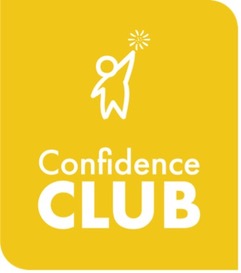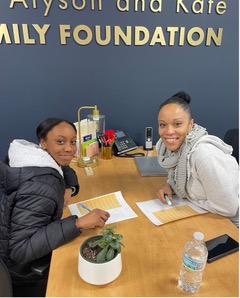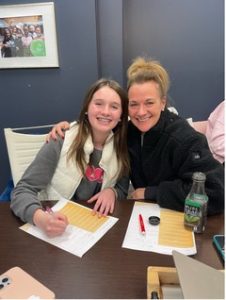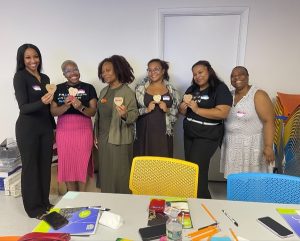

The Confidence Club, created by The Hance Family Foundation in Floral Park, NY, provides Social and Emotional Learning activities that build participants’ self-awareness, emotional regulation, relationship-building skills, and understanding of the importance of community service and civic engagement.
The Hance Family Foundation (HFF), is a nonprofit foundation that has developed a suite of five self-esteem-building programs that help children and adults develop the social and emotional tools they need to succeed in school, at work, and in life. Each program has a unique curriculum, but they all share the same goals: empowering people with the confidence they need to succeed. selfesteemrising.org
The Confidence Club is one of our most popular programs. This gender-neutral, year-long program for school-aged children provides social emotional learning activities that build participants’ self-awareness, emotional regulation, relationship-building skills, and understanding of the importance of community service and civic engagement.
History
The Confidence Club curriculum was created in May 2020 when girls who had experienced HFF’s flagship program self-esteem-building program, Beautiful Me, were contending with pandemic isolation and seeking connection and confidence. In response to this need, Kate Tuffy, our program developer, created 11 activities that parents could do at home with their children to foster resilience and comfort during the crisis.
Before long, staff at HFF began using the 11 lessons in Zoom sessions with our own program participants, and we posted them on our website as free downloads for more parents and educators looking for content. As we saw parents and teachers consistently using and recommending these lessons, we packaged them together as The Confidence Club.

Activities
The Confidence Club curriculum is gender-neutral and appropriate for all school-aged children. Lessons feature Social and Emotional Learning activities that address topics like emotional regulation, healthy relationship building, identifying your support system, asking for help, and more. Participants develop self-care tools, confidence, and security.
Since the pandemic abated, we have seen Confidence Club lessons used in a wide variety of ways, both virtually and in person. Some parents still print lessons and use them with their kids, and some mental health practitioners use lessons during individual and/or group counseling. Many schools have chosen to create after school clubs which engage with a lesson or activity in person each week or each month, while other schools have added in person Confidence Club lessons to existing group activities as an icebreaker.
Frequently, Confidence Club activities are used as part of larger social and emotional learning curricula being offered. For example, our flagship self-esteem-building program, Beautiful Me, is designed only for girls and women, so Confidence Club is often requested by schools and other organizations as a male complement to Beautiful Me or as an alternate, gender-neutral offering for students. Other times, Confidence Club is featured as a continuation of Beautiful Me, for girls who want to stay engaged.
The 11 Confidence Club lesson plans can be downloaded for free at: https://www.selfesteemrising.org/lessonplans and can be delivered in person or virtually. Additional self-care tips and activities can be found at the same link.
We are working on convening a panel of experts to help us create 50 new culturally sensitive lesson plans targeted for even wider age groups and more diverse communities. We will post those as they become available.
Impact
Confidence Club has proven extremely successful at building self-esteem at schools and agencies all over the country.
Based on our surveys and evaluations, Confidence Club participants (and our other Self-Esteem Rising program recipients) almost always leave our programs feeling better equipped to meet life’s challenges, take advantage of opportunities, believe in themselves, and achieve their goals. Better still, many educators have noted significant culture improvements at their schools because our programming, including reductions in disciplinary problems, decreased bullying, and stronger child-teacher relationships.
HFF regularly receives feedback like this from Confidence Club participants:
“I feel like this workshop has made a big impact on how I view myself and it has also opened up doors to things I haven’t realized about myself.”
“I took away it’s okay to take the good and bad aspects of yourself. It allows you to improve from the inside and out.”
“It made me think of how I feel about myself, what I can do for self care. I am learning in this workshop… being able to ask for help when I couldn’t do it before.”
And, one partner who works with a neurodivergent population shared this:
“The tailored approach of the Hance Family Foundation ensures that neurodivergent young adults, who often face unique challenges in emotional regulation and social interactions, receive the support and tools they need to thrive. By addressing these needs, Confidence Club fosters greater self-confidence, empathy and resilience, while also promoting inclusivity and understanding in a safe and supportive environment.”

Recommendations for Adaptation or Replication
Confidence Club is one of our most popular offerings. As we have seen during the pandemic and since, it is a very adaptable program and almost infinitely replicable .
Unlike our other four self-esteem-building programs, all of which must be led by educators or mental health professionals who have been specifically trained by HFF, Confidence Club lessons can be accessed and led by any adults with no training required — Just download and go.
Each lesson comes with step-by-step instructions and the ad-hoc ‘pick and choose’ nature of the program makes it easy for any person or organization to adopt and tailor.
The 11 Confidence Club lesson plans can be downloaded for free at: https://www.selfesteemrising.org/lessonplans
Additional information about The Hance Family Foundation and its Self Esteem Programs
Vision Research has proven again and again that positive self-esteem is a critical component of good emotional, psychological, and physical health. The Hance Family Foundation’s mission is to develop and deliver inclusive, scalable self-esteem-building programs that improve participants’ personal, academic, and professional outcomes. Through partnerships with schools, social service agencies, prisons, hospitals, corporations, and more, we are equipping people of all ages and backgrounds to realize their potential and thrive.
History: The Hance Family Foundation (HFF) was founded in 2009 by Jackie and Warren Hance after a devastating car accident took the lives of their 8-, 7- and 5-year-old daughters, Emma, Alyson, and Katie.
During their short lives, the Hance girls were widely known for their positive energy and exuberant self-confidence – confidence that, studies show, peaks for most girls at only age eight before declining precipitously. To create a legacy for Emma, Alyson, and Katie, the Hance Family established a foundation dedicated to fostering girls’ self-esteem and maximizing their potential.
When we launched 16 years ago, we offered only a single body-positivity program at the Hance girls’ former school. Building on the success of that one program, HFF has grown into a social-emotional learning powerhouse and has provided programming to more than 250,000 people.
Today, informed by experts and guided by a much deeper understanding of what people need to truly thrive, we offer a suite of five confidence-building programs, known as Self-Esteem Rising, with curricula that help people of all ages and genders develop key mental health competencies and become their best selves.
WHY DO WE NEED SELF-ESTEEM PROGRAMMING?
In Your Child’s Self Esteem, Dorothy Briggs articulates what we all know intuitively: “Self- esteem is the mainspring that slates every child for success or failure as a human being,”
A 2022 self-esteem study underscores this, finding that — not only is self-esteem beneficial to relationships, school, work, mental health, and physical health for all individuals regardless of age, gender, or race/ethnicity — properly designed and implemented interventions can actually benefit society as a whole.
| Low Self-Esteem is Correlated With: | High Self-Esteem is Correlated With: |
|
|
|
|
|
|
|
|
|
|
|
|
|
|
|
|
|
|
|
|
Self Esteem Rising Programs & Activities
Self-Esteem Rising is comprised of the following 5 programs:
Beautiful Me: A 3-hour workshop appropriate for girls and women from 5-105. This is our flagship program, and activities center on increasing body positivity, developing problem-solving skills, encouraging healthy self-esteem and relationship building.
Confidence Club: A gender-neutral program inspired by graduates of Beautiful Me hungry for more programming. This is a more flexible ‘club-style’ program appropriate for both girls and boys that can be offered on its own, as a continuation of Beautiful Me, or as a curriculum for boys while girls engage with Beautiful Me. Confidence Club lesson plans include SEL activities that build self-awareness, emotional regulation, relationship-building skills, and a commitment to community service.
The Ambassador Program: An application-based program for outstanding 14-22-year-olds. Focusing on pre-professional topics and competencies, this program explores concepts like leadership, goal setting and volunteerism. Participants are empowered to become influential voices in their schools, communities and workplaces.
Raising a Beautiful Child: A seminar designed for adult caregivers of boys and girls. This gender-neutral, discussion-based program helps parents foster self-esteem and self-efficacy in their children. It is a great complement to any of our other programs, as it enables parents to reinforce and build upon what children are learning in their programs and it helps build the social emotional competencies of the entire community. Participants learn techniques to connect with their children, promote active learning, foster independence, and nurture their children’s self-esteem.
Empower Me: A workshop designed for women on college campuses and in corporate settings. This one-of-a-kind program helps women bridge the confidence gap at work. Participants learn techniques that help them cultivate success, both personally and professionally.
Impact
Based on our surveys and evaluations, Confidence Club participants and all other Self-Esteem Rising program recipients almost always leave our programs feeling better equipped to meet life’s challenges, take advantage of opportunities, believe in themselves, and achieve their goals.
And, many educators note significant culture improvements at their schools because of after our programming, including reductions in disciplinary problems, decreased bullying, and stronger child-teacher relationships.
Our flagship program, Beautiful Me, had its impact professionally evaluated in 2020 by the Judge Baker Children’s Center (an affiliate of Harvard Medical School) to confirm it improves the critical social, academic, and mental health competencies identified by the field’s benchmark organization, the Collaborative for Academic, Social, and Emotional Learning (CASEL). Every single participant surveyed in the Baker evaluation reported leaving our program with higher levels of self-esteem, happiness, and confidence, and all recommendations made by evaluators were integrated into our other Self-Esteem Rising programs.
Notably, 16 years into our programming we are growing faster than ever before, based mostly on word of mouth. We are on track to triple our programs next year alone.

Recommendations for adaptation or replication: Keys to Success
Because our goal is to reach as many people as possible, as HFF has developed and refined Confidence Club and our other programming over the years, we have always kept an eye on adoptability and scalability. Some key choices that have made our programs so successful include:
- All our programs are completely free and inclusive so any educator or mental health professional can launch them in any community.
- We have employed experts to help us develop the curricula and, later, we had both our curricula and our training protocol professionally evaluated to ensure they were high quality and fundable.
- Instead of relying on HFF employees to deliver our programs, which would obviously limit our scope, we created a self-paced, virtual training protocol that enables us to equip people all over the world to deliver our programs with minimal employee hours. HFF staff members do play a personal role in the training, but it is a limited role and also a virtual one. This model has not only minimized our costs and maximized our program scalability but, crucially, it has also maximized inclusivity by ensuring that people with deep knowledge of their communities are leading the programs, and it has maximized program.
- Our Confidence Club program does not require any training at all, which we have found makes it a good entry point for some partners who are just getting started with social and emotional learning. It can be helpful to have one low-threshold opportunity like this to get people engaged.
- Sustainability is important. Once teachers have been trained by HFF, they can go on delivering HFF’s self-esteem building programs indefinitely, expanding to additional groups or grade levels and continuing programs year after year with very little re-engagement of our staff. Teachers will need new supplies each time they run a program, but HFF ships those free upon request AND this keeps the teachers in touch with HFF so we can track all our programs, get feedback, offer training refreshers when necessary, etc. This also leaves a trained role model on site wherever a program is offered.
- Identify champions at organizations whose clients you would like to reach.
- As you are able, strive to develop broad-based partnerships – build a relationship with a school district, not just a school, and provide the programming to students at multiple, developmentally-appropriate age points. On occasion, students who experienced a program as elementary schoolers, have repeated the program in middle school and have gotten further involved as role models for the younger students. This has been a very successful adaptation for both age groups.
- When providing programs to children, provide programming for caregivers as well so lessons get reinforced, and the community can learn to speak one language.
- Call HFF – we provide our programming free of charge to anyone who requests it.
Contact
Website: selfesteemrising.org
Shanthy Hughes, LMSW, Director of Programs
Hance Family Foundation
shughes@hancefamilyfoundation.org
Office: (516) 688-0055
Cell: (516) 639-0080
